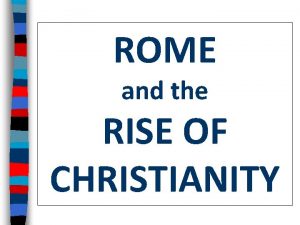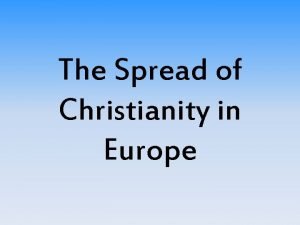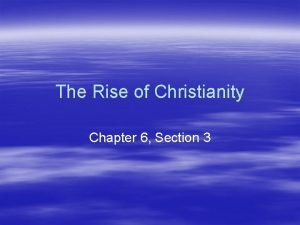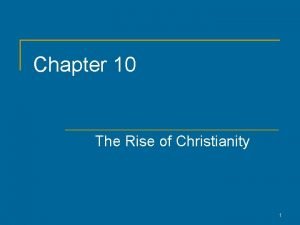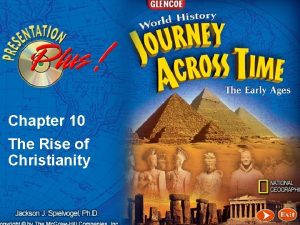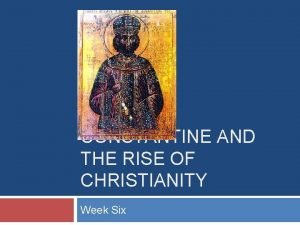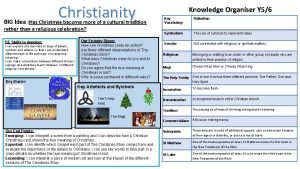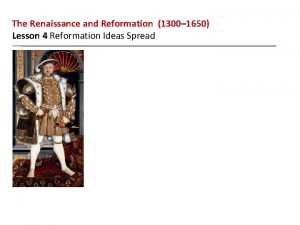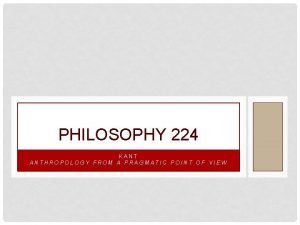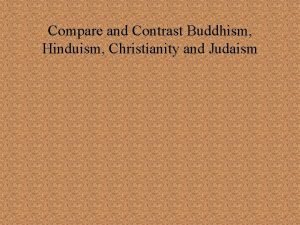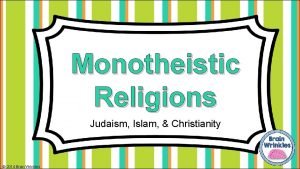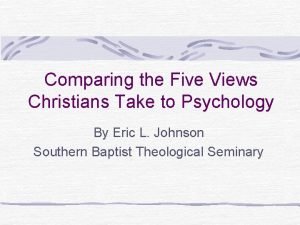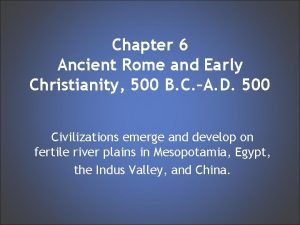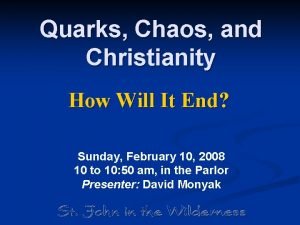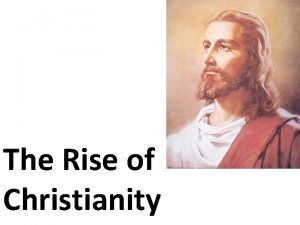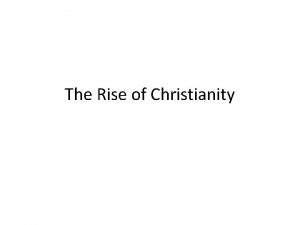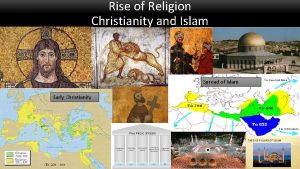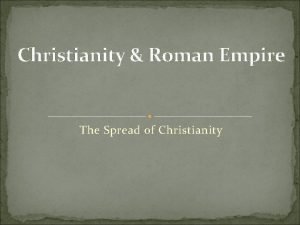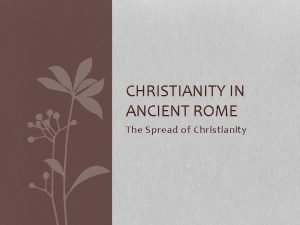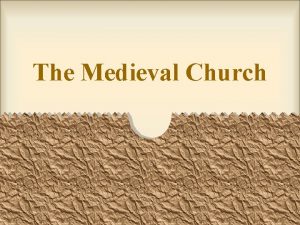Rise and Spread of Christianity MAIN IDEAS Christianity










































- Slides: 42

Rise and Spread of Christianity

MAIN IDEAS Christianity built upon the Jewish belief in one God and the concept of a Messiah. The disciples of Jesus came to believe that he was the Messiah. According to the Gospels, Jesus was executed but rose from the dead. Christians believe that this makes freedom from sin and death possible for everyone.

Christianity emerged at a time of widespread unrest in the Roman province of Judaea (Palestine). Christianity is based on the life and teachings of Jesus of Nazareth Christ comes from the Greek word “christos” which means “messiah” or “anointed one”

Christianity’s Jewish Roots

Roman Judea

Looking for a Messiah Christianity grew from Judaism and ideas of Jesus—a Jewish teacher Romans conquered Jewish kingdom of Judah (Judea) in 63 B. C. Jewish kings had to be approved by Rome Many Jews sought freedom from foreign rulers Sacred writings promised a Messiah who would free them Some believed the ruler would be descended from King David

The Life of Jesus

Birth and Early Life There are few written historical accounts of Christianity's early history. What we know comes from the writings of disciples (followers) Writings are called Gospels (good news) Gospels—accounts of Jesus’ life by Matthew, Mark, Luke, John Along with other writings, they make up New Testament

Gospels say Jesus was born in Bethlehem raised in Nazareth by Mary and by Joseph, a carpenter Christians later celebrated his birth on Christmas

The Teachings of Jesus preached justice, compassion, coming of God’s kingdom delivered teachings in parables—stories with morals asked people to love and pray for enemies; to live simply, humbly Some Jewish leaders angered by Jesus’ teachings were upset that some followers claimed Jesus was the Messiah

The Death of Jesus

Arrest and Trial The claim that Jesus was the Messiah was a threat to Roman rulers power, authority of Roman rulers was questioned followers called Jesus “king” when he came to Jerusalem During Passover, Jesus criticized running of Jerusalem Temple Jewish leaders appointed by Rome arrested Jesus turned him over to Romans for punishment

The Story of the Resurrection Jesus was executed by Roman governor Pontius Pilate executed by crucifixion—hanging on cross until suffocated buried in tomb with stone blocking entrance Gospels say that the third day after death, followers went to tomb was empty; some followers say Jesus walked, talked with them Account of resurrection proved to followers that Jesus was divine Resurrection—return to life Followers believed Jesus gave life to create new world in new world sin and death are defeated Christians believe crucifixion was on Good Friday Resurrection was on Easter Sunday

The Resurrection The apostles belief in the physical resurrection of Jesus was the foundation of a church to promote his teachings. The message of the apostle Peter’s first sermon was that Jesus had died and risen to be with Yahweh and that baptism marked the adherence of those who accepted his resurrection.

REVIEW QUESTION What event made Jesus’ followers believe their leader was divine?

The Early Christians & The New Faith Romans followed a number of religions and also allowed a great deal of freedom to other religions. Jews and Christians began to disagree on religious grounds, and Christianity slowly became a separate religion. Jews and early Christians shared the same basic beliefs, but differed on the idea of the messiah. At first, Christians concentrated on trying to convert other Jews. After serious debate, the early Christians decided to preach Christianity to the Gentiles.

Christianity might have remained a purely Jewish sect had it not been for Saul of Tarsus

St. Paul: Apostle to the Gentiles

Paul of Tarsus a Jewish Roman citizen converted to Christianity and took the name Paul made three long journeys throughout Asia Minor and along the coast of the Aegean to spread Christianity and establish Christian communities.

The Works of Paul's Roman citizenship, the good roads, and listeners open to new ideas helped Paul spread Christianity in the Greek-speaking world. Emphasized that Christianity was not just a sect of Judaism

The Works of Paul Taught that Jesus, by his death and resurrection, had fulfilled the prophecy of Judaism and initiated a new age. Taught that Jesus was the son of God, the giver of a new law, and preached that Jesus’ teachings were open to all

The Works of Paul Made a significant break with Judaism Seek converts According to tradition, while in Rome, Paul preached and taught for two years before being executed.

Rome's Early Response At first the Romans paid little attention to the Christians. Some Romans were quite suspicious of Christians, and Nero blamed them for starting a major fire that destroyed much of Rome. Although by A. D. 100 there was a law condemning admitted Christians to death, it was seldom enforced.

PERSECUTION Great persecutions of Christians began in 3 rd century AD Christian intolerance of pagan beliefs bred powerful retaliatory hatred of Christians Accused Christians of cannibalism, atheism, and of being haters of mankind Charged with being sneaky and with dishonoring the emperor Also blamed with all the evils that afflicted the state

The Attack on Christianity In A. D. 250 Emperor Decius ordered the execution of all Christians who refused to worship the Roman gods. Up until A. D. 311, Christians suffered two more waves of persecution under two different emperors. Roman mobs destroyed Christian churches and sacred books. Christians were fired from jobs, forced to leave the army, attacked, and killed.

REVERSAL OF FORTUNE In the end, the persecutions did not succeed in eliminating Christianity Too many Christians protected each other Persecutions also created martyrs who inspired others Came to an end with death of Galerius and then Constantine officially protected them Constantine credited with being the first Christian emperor Constantine

Constantine Placed himself and his army under the protection of the Christian God After his victory, he declared himself a Christian and supported Christianity throughout the empire. Baptized on his deathbed in A. D. 337

Constantine and the growth ofof. Christianity issues the Edict Milan allowing for religious toleration made it legal for Christians to worship, gave money to the church, and became involved with church decision-making. gave Christianity the support of the Roman authorities, but also combined religion and government.

VICTORY Theodosius became emperor in 379 AD and proclaimed Christianity to be the official religion of the state Christians immediately begin to persecute pagans Destroyed temples or converted them into churches Church firmed up its organization and settled disputes with powerful intellectual strength

How did the Roman Empire help spread Christianity? During Pax Romana, missionaries traveled safely Roman Roads helped to spread quickly Constantine converted Constantine built churches in Rome and Jerusalem Religious freedom Christianity becomes official religion of the Roman Empire

The Spread of Christianity After Jesus’s death, his disciples began teaching that all people could achieve salvation—the forgiveness of sins and the promise of everlasting life. • Apostles: Jesus’s 12 disciples worked to spread message • Earliest Christian missionaries • Apostles traveled widely, teaching mostly in Jewish communities

• Paul, originally known as Saul, born in Tarsus, in Asia Minor • Had actively opposed those teaching that Jesus was the Messiah • Paul had conversion on way to Damascus, became Christian • If not for his work, Christianity might have remained a branch of Judaism

Converting the Gentiles • • Paul believed God sent him to convert non-Jews, or Gentiles Paul helped make Christianity broader religion, attracted many new followers Helped establish Christian churches throughout eastern Mediterranean Paul’s epistles, or letters, to those churches later became part of the New Testament Paul found some Jewish customs hindered missionary work among non-Jews, dispensed with those requirements for Christians Paul emphasized new doctrines that helped distinguish Christianity from Judaism Christianity spread; message of love, eternal life after death found appealing By AD 300, some 10 percent of Roman people were Christian

• As Christianity spread through Roman world, some local officials feared Christians conspiring against them; arrested, killed many Christians • Those killed seen by Christians as martyrs, people who die for their faith • Christians persecuted at local level, but large-scale persecution rare during first two centuries after Jesus’s life • Large-scale persecution by Romans grew as rulers saw Christianity as threat • Spread of Christianity hastened by conversion of emperor Constantine • AD 313, Constantine made Christianity legal within empire, Edict of Milan • By late 300 s, polytheism gradually disappeared from empire

Then, What helped spread Christianity through the Roman world?

Answer(s): Paul of Tarsus and other disciples; Constantine’s conversion; outlawing of public non-Christian sacrifices by Theodosius (d. 395)

Early Christianity (c. 31/33– 325) During its early history, Christianity grew from a 1 stcentury Jewish following to a religion that existed across the entire Greco-Roman world and beyond. Early Christianity may be divided into 2 distinct phases: the apostolic period, when the first apostles were alive and led the Church, and the post-apostolic period, when an early episcopal structure developed, and persecution was periodically intense. The Roman persecution of Christians ended in AD 313 when Constantine the Great decreed tolerance for the religion. He then called the First Council of Nicaea in AD 325, beginning of the period of the First seven Ecumenical Councils.

Apostolic Church The Apostolic Church was the community led by the apostles, and to some degree, Jesus' relatives. [7] In his "Great Commission", the resurrected Jesus commanded that his teachings be spread to all the world. While the historical reliability of the Acts of the Apostles is disputed by critics, the Acts of the Apostles is the major primary source of information for this period. Acts gives a history of the Church from this commission in 1: 3– 11 to the spread of the religion among the Gentiles[8] and the eastern Mediterranean by Paul and others. The first Christians were essentially all ethnically Jewish or Jewish proselytes. In other words, Jesus preached to the Jewish people and called from them his first disciples, see for example Matthew 10. However, the Great Commission is specifically directed at "all nations, " and an early difficulty arose concerning the matter of Gentile (non-Jewish) converts as to whether they had to "become Jewish" (usually referring to circumcision and adherence to dietary law), as part of becoming Christian.

Early Christian beliefs The sources for the beliefs of the apostolic community include the Gospels and New Testament epistles. The very earliest accounts of belief are contained in these texts, such as early creeds and hymns, as well as accounts of the Passion, the empty tomb, and Resurrection appearances; some of these are dated to the 30 s or 40 s CE,

Post-Apostolic Church The post-apostolic period concerns the time after the death of the apostles (roughly 100 AD) until persecutions ended with the legalisation of Christian worship under Emperors Constantine the Great According to the New Testament, Christians were subject to various persecutions from the beginning. This involved even death for Christians such as Stephen (Acts 7: 59) and James, son of Zebedee (12: 2). Larger-scale persecutions followed at the hands of the authorities of the Roman Empire, beginning with the year 64, According to Church tradition, it was under Nero's persecution that Peter and Paul were each martyred in Rome. Similarly, several of the New Testament writings mention persecutions and stress endurance through them.

Reasons for the spread of Christianity In spite of these at-times intense persecutions, the Christian religion continued its spread throughout the Mediterranean Basin. [17] There is no agreement on an explanation of how Christianity managed to spread so successfully prior to the Edict of Milan and the establishment of Christianity as the state religion of the Roman Empire. In The Rise of Christianity, Rodney Stark argues that Christianity triumphed over paganism chiefly because it improved the lives of its adherents in various ways. Another factor was the way in which Christianity combined its promise of a general resurrection of the dead with the traditional Greek belief that true immortality depended on the survival of the body, with Christianity adding practical explanations of how this was going to actually happen at the end of the World. For someone the rapid progression of Christianity was explained by two factors: translations of the New Testament and the Apologies composed in defence of Christianity

The Spread of Christianity by 600
 Christianity main ideas
Christianity main ideas Where did christianity originate
Where did christianity originate Tricky dick
Tricky dick Rome and the rise of christianity
Rome and the rise of christianity Spread of christianity in europe
Spread of christianity in europe Why did romans treat christians so badly?
Why did romans treat christians so badly? Rise and rise until lambs become lions
Rise and rise until lambs become lions Raise and rise again until lambs become lions
Raise and rise again until lambs become lions Rise and rise again until lambs become lions origin
Rise and rise again until lambs become lions origin Chapter 6 section 3 guided reading the rise of christianity
Chapter 6 section 3 guided reading the rise of christianity Chapter 10 the rise of christianity
Chapter 10 the rise of christianity Chapter 10 the rise of christianity
Chapter 10 the rise of christianity The rise of constantine
The rise of constantine Christianity big ideas
Christianity big ideas How did enlightenment ideas spread
How did enlightenment ideas spread Unit 12 lesson 4 reformation ideas spread
Unit 12 lesson 4 reformation ideas spread What renaissance invention aided the spread of ideas?
What renaissance invention aided the spread of ideas? Ideas have consequences bad ideas have victims
Ideas have consequences bad ideas have victims Ideas principales e ideas secundarias
Ideas principales e ideas secundarias Tells more about the main idea
Tells more about the main idea Voltaire main ideas
Voltaire main ideas Voltaire and locke
Voltaire and locke Voltaire main ideas
Voltaire main ideas Big paragraph
Big paragraph Ideas of john locke
Ideas of john locke Baron de montesquieu main ideas
Baron de montesquieu main ideas A key intellectual movement of the renaissance
A key intellectual movement of the renaissance Kant philosophy
Kant philosophy Hume's fork examples
Hume's fork examples Stated main idea examples
Stated main idea examples Implied main ideas
Implied main ideas Main ideas of existentialism
Main ideas of existentialism Main topic definition
Main topic definition Townsend press chapter 4 implied main ideas
Townsend press chapter 4 implied main ideas Puritanism main ideas
Puritanism main ideas Hinduism and judaism compare and contrast essay
Hinduism and judaism compare and contrast essay The will future
The will future Void main int main
Void main int main Abrahamic religions
Abrahamic religions Levels of explanation christian psychology
Levels of explanation christian psychology Ancient rome and early christianity chapter 6
Ancient rome and early christianity chapter 6 Judaism vs islam chart
Judaism vs islam chart Big crunch
Big crunch



